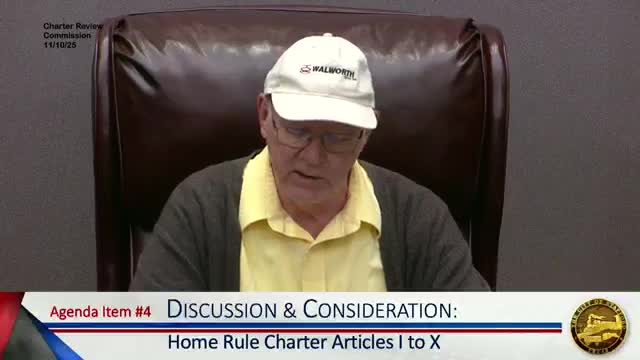Stafford Charter Review Commission backs mayor reporting changes and formalizes mayor pro tem selection
Get AI-powered insights, summaries, and transcripts
Subscribe
Summary
The Stafford Charter Review Commission on Monday night advanced a package of proposed Home Rule Charter changes, including a new requirement that the mayor’s annual report list unaccomplished goals and strategies to complete them, a tenure‑based order for selecting the mayor pro tem with a supermajority override, and a one‑year term limit for the mayor pro tem.
The Stafford Charter Review Commission on Monday night advanced a package of proposed changes to the city’s Home Rule Charter that would require the mayor’s annual report to list unaccomplished goals and how the administration plans to complete them, formalize a tenure-based order for selecting the mayor pro tem with a supermajority override for exceptions, and limit the mayor pro tem to a one‑year, nonconsecutive term.
Commissioners opened consideration of Articles 1 through 10 and agreed to move through each article in order and to limit discussion on that block to one hour. After debate, the commission voted to add a new provision asking the mayor, in the annual report, to identify goals from the prior reporting period that were not accomplished and provide the reasons and proposed strategies to finish them. “We failed to actually hear as a public all the goals that did not get accomplished and the reasons for them not getting accomplished and a strategy to make them accomplished,” said Commissioner (Speaker 3) in support of the change.
Commissioners also pressed for greater long‑term financial context in the mayor’s address. Several members said the city needs an outlook that goes beyond a single‑year horizon to help residents and future administrations anticipate costs for large, aging infrastructure. One commissioner observed that replacing much of Stafford’s street network over 20–30 years could amount to “a couple of $100,000,000,” underscoring the scale of long‑range needs. The commission asked the city attorney to draft precise language to add a separate bullet requiring a comment on long‑term goals or financial outlook and to circulate draft wording before the next meeting.
The meeting’s lengthiest debate focused on the mayor pro tem and succession. Commissioners disagreed about whether the charter should bind City Council to a strict rotation or give council discretion to pick the best candidate. To strike a balance, the commission approved language requiring council to select the mayor pro tem according to tenure (seniority) while allowing Council to override the order only by a supermajority vote. Commissioner (Speaker 7) framed the choice as a matter of enforceability: “The Home Rule Charter should be a thou shall or thou shall not document,” he said, arguing for clearer obligatory language. The commission also approved a related motion limiting the mayor pro tem’s term to one year and preventing repeated successive appointments absent a supermajority override.
On committees, commissioners debated whether council members should be permitted to serve as officers of citizen committees—especially committees that receive or request city funding. The commission asked the attorney to draft recommended language distinguishing ‘council committees’ (internal workgroups) from ‘council‑citizen committees’ and to propose a firewall so that citizen committees are led by citizens rather than sitting council officers; formal changes to section 3.06 were tabled pending that drafting.
The commission also approved cleanup of Article 5 (Elections), removing outdated implementation wording and striking an obsolete plurality‑election clause that no longer fits Stafford’s position‑based election format. The body approved the October 16, 2025 minutes, set a calendar of upcoming meetings, and directed staff to provide a list of current committees and memberships to inform the committee‑leadership discussion.
All of the commission’s substantive changes at this meeting were approved by voice vote; the meeting record does not include a roll‑call tally. The commission will forward its recommended wording to the city attorney for drafting and to City Council, which must decide whether to place any amendments before voters.
The commission adjourned at approximately 8:10 p.m.
